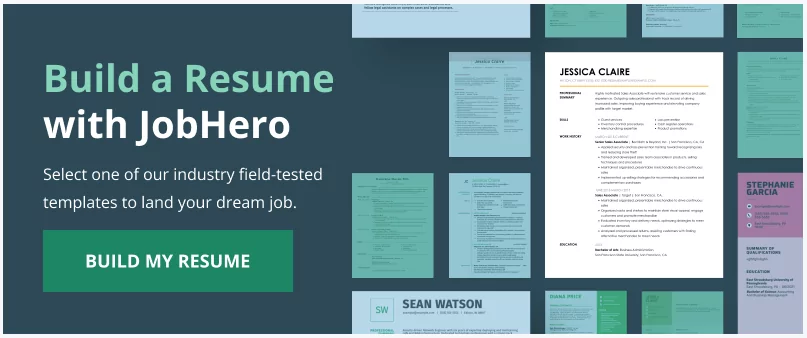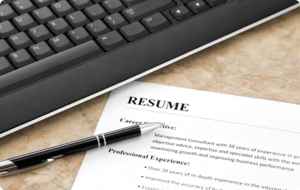- FEATURED IN :

What are Analytical Skills?
Analytical skills refer to your ability to break down a problem, gather facts, and find a logical solution. Analytical thinkers not only identify the problem but also create a solution. Recruiters look to hire applicants with strong analytical skills because it ensures solutions and efficiency in the workplace.
Having employees with strong analytical skills also brings value to the company’s productivity and success. Being analytical means that you can think outside of the box to bring innovative solutions that have been analyzed and planned thoroughly.
Analytical thinking looks at complex problems from different angles to formulate the most efficient solutions. Let’s breakdown the analytical thinking process:
- Identify the problem.
- Gather information.
- Develop new ideas and create solutions.
- Take action.
- Analyze and review effectiveness.
The overall goal of analytical thinking is to create solutions that bring productivity and success. This requires observation, logic and information gathering.
Top Analytical Skills
Analytical skills are basically what you lean on when facing a complex situation. It’s how you assess a concern and approach it.
They are made up of multiple skills that consist of different abilities to tackle a problem. Here are the top analytical skills that can positively impact how you handle difficult situations:
Brainstorming
Brainstorming cultivates team play. It brings together different perspectives and ideas to be discussed and evaluated. This is a breakdown of ideas to reach the best possible solution. Brainstorming is essential in the workplace.
Attention to detail
Being attentive to detail increases your productivity and reduces error. It also produces quality by being thorough and accurate when accomplishing tasks. Developing strong attention to detail requires practice.
Tenacity
Tenacity is the drive and determination to achieve a goal. It is about not giving up until you do. By developing tenacity, you can give yourself the fuel to keep going through adversities and challenges. People with tenacity tend not to give up and find ways to overcome a task or find a solution to a problem.
Foresight
Having foresight is the ability to interpret situations to reduce errors and risks accurately. It approaches complex problems anticipating consequences and outcomes.
Research
Research provides us with the information gathering and knowledge needed for problem-solving. It helps generate useful information to solve problems.
Critical thinking
Critical thinking is the process of analyzing facts. It’s needed to solve problems as quickly and as effectively as possible. By practicing critical thinking, we are allowing ourselves to come up with new and creative solutions. If you practice critical thinking, you find inconsistencies and errors and use logical thinking to solve complex situations.
Decision making
Problem-solving and decision-making go together, and each requires creativity in identifying and developing possible solutions. Good decision-making gathers all the facts to have a better understanding of the situation. It requires a creative clarity of judgment, firmness of decision for effective implementation.
Analytical skills have become the standard by which candidates are measured. These skill sets are highly sought-after and can easily transfer between industry fields. They’re a direct reflection of your professionalism and how you handle challenges throughout your career.
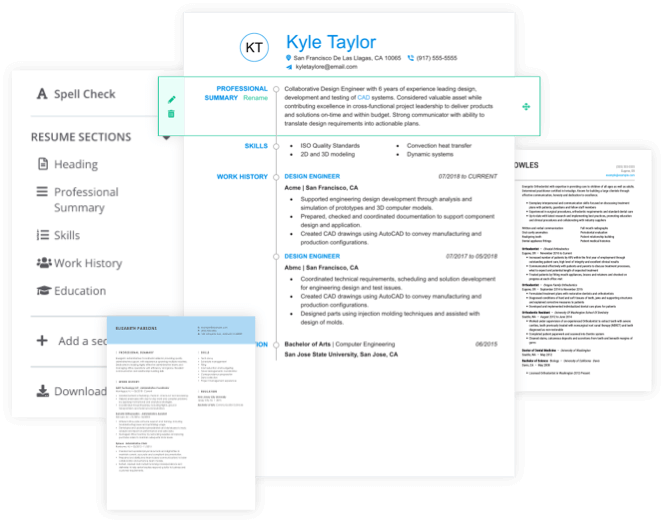
How to Showcase Analytical Skills
Employers look for candidates with analytical skills because they improve the company’s productivity and overall performance. There are three places candidates can show analytical skills: in your resume, cover letter, and during your interview.
How to showcase analytical skills on your resume
Resumes will vary based on experiences and skill set. However, analytical skills should never be left out. There are several ways to incorporate analytical skills into your resume.
Summary
In your resume introduction, provide a summary of your top qualifications using key analytical skills to highlight your accomplishments.
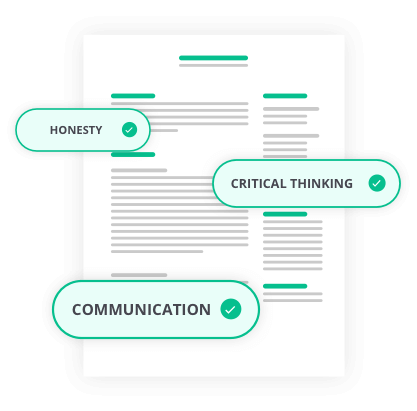
Example: Ten years of Accounting CPA experience. Critical thinker with the ability to interpret financial errors, discrepancies, and inaccuracies. Expert at assessing financial risks and implements strategies to avoid losses.
Skills section
Start by reviewing the job posting. This will help identify those sets of skills that the employer is looking for. Have a separate section in your resume dedicated exclusively to your skills. Use six to eight bullets to itemize your skills, and include those listed in the job description if you possess them.
You can mix both hard and soft skills. Keep in mind that hard skills are abilities that are learned and can be quantified, while technical skills are industry-specific.
Soft skills are traits that define your personality. These are the skills that will allow you to highlight analytical abilities such as problem-solving and critical thinking.
In your skills section, include key analytical skills along with your list of industry-specific abilities:
- Leadership skills
- Auditing
- Financial planning
- Financial risk management
- Insolvency
- Management
Another example of key skills that will show off your capacity to be analytical:
- Communication
- Critical thinking
- Research
- Problem-solving
- Creativity
Work experience
Use your work history section to introduce employers to your strengths and abilities. Add actual examples of the times when you used analytical thinking to overcome challenges and produce results. Write short, concise statements that are easy to follow. Instead of just putting “research,” you can provide the recruiter with valuable background and examples of research and ideas you contributed with.
Example: “Proven success at solving complex challenges during the economic impact of the recession by identifying the deficit and utilizing a combination of research, creativity, and critical thinking to optimize the supply chain.”
How to showcase analytical skills during your cover letter
A cover letter is the opportunity to highlight your credentials and demonstrate that you are a candidate with strong analytical skills. You can provide more in-depth information about your experiences. Showcasing analytical skills is an important factor for increasing your chances of employment.
Start by customizing your cover letter to match the job description. When writing about your skills, avoid meaningless phrases such as, “I have strong analytical skills,” which will get you nowhere. Instead, discuss the times where you have used analytical thinking to solve critical situations.
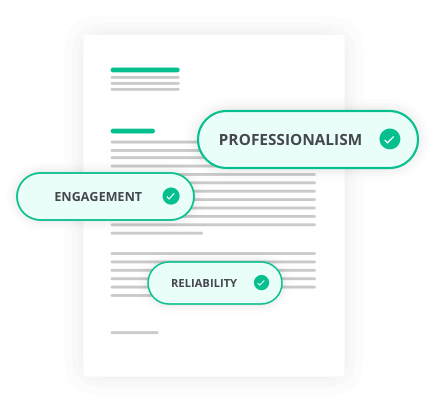
Keep recruiters engaged by making your cover letter relevant and straightforward. Dedicate one paragraph to provide moments where you used analytical skills to overcome challenges and deliver solutions.
Share a specific time in your career when you used your analytical skills to overcome a challenge or reach your goals. Stay relevant by relating your story to the job and why it makes you a strong candidate for the position. You should also use numbers where possible to prove your impact. Be convincing by explaining how these experiences contribute to the company’s success.
Here is an example of what you can include in your cover letter:
“While working as a front desk agent, I resolved guest challenges throughout their stay in our hotel. One of my biggest accomplishments was to implement blocking a minimum of 10 rooms daily. This provided availability for last-minute reservations for tourists with delayed flights. As a result, it created a new hotel program offering guaranteed availability services.”
For more on cover letters, check out our Cover Letter Builder to create a personalized letter in minutes.
How to showcase soft skills during your interview
Use your analytical skills to stand out. Interviewers prepare questions to learn more about your skill sets. They will ask you to provide examples that will show off your analytical skills
Before your interview, it’s always a good idea to prepare answers to commonly-asked interview questions. You should also be ready to answer questions regarding difficult decisions or your thought process to overcome challenges.
Examples of common analytical skills interview questions:
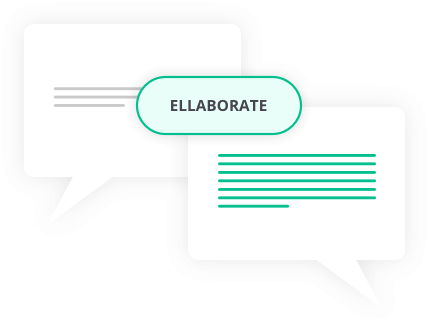
- Describe a time when you faced a sudden problem in the workflow. How did you handle this situation?
- How do you use the information to make decisions?
- Describe your problem-solving process.
- How do you decide how to prioritize your time?
- What is your approach to finding the deficit and testing new ideas?
Use your responses to provide detailed examples of times that you’ve used your analytical skills in the past and how they solved issues for previous employers.
To prepare for your interview, check out JobHero’s most commonly asked interview questions.
How to Improve Analytical Skills
Building skills is a lifelong commitment. Keep looking for new goals that will strengthen your personal growth.
Self-improvement is a lifetime commitment that involves continuous learning. To make it easier, start incorporating continued education into your daily routine.
Let’s look at the top four simple strategies to fuel your skills:
Have fun. A fun way to practice analytical thinking is by playing games. Find crossword puzzles and solve logic games.
For example, computer games require players to make quick critical decisions. In contrast, jigsaw puzzles improve your concentration and focus. Board games like chess also help expand problem-solving skills.Tune in. Find audiobooks and podcasts that you can listen to every day that require examining situations from multiple angles and problem-solving, such as riddles and mystery novels.
Read. Reading is a healthy habit that stimulates your mind. It also boosts analytical thinking. Books hold the power of knowledge. Active reading creates engagement and concentration that helps improve analytical skills.
Continuous learning. Sharpen your skills daily by taking online courses. There are plenty of workshops created with techniques to develop key areas such as critical thinking and problem-solving.
Harvard Business School recommends taking an online analytics course as an effective way to brush up on your skills or expand your knowledge. It also provides the opportunity to network and interact with mentors and professionals in your field.
Learning new things daily triggers the ability to think more logically and contributes to your career success!



